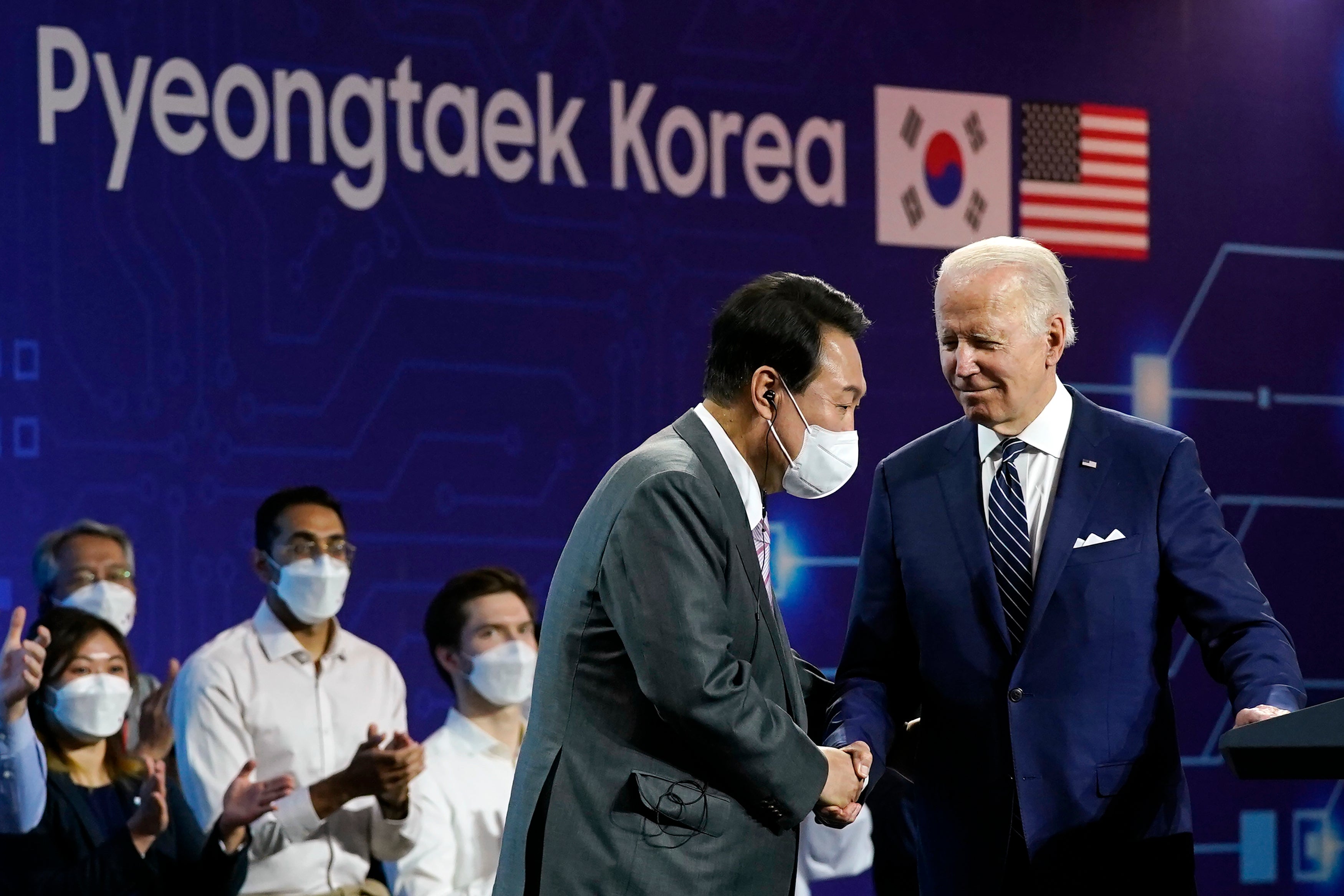US, South Korea look to expand military exercises to deter nuclear threat from North
Joe Biden landed in Seoul on Friday in his first visit to Asia since assuming office in 2020
Your support helps us to tell the story
From reproductive rights to climate change to Big Tech, The Independent is on the ground when the story is developing. Whether it's investigating the financials of Elon Musk's pro-Trump PAC or producing our latest documentary, 'The A Word', which shines a light on the American women fighting for reproductive rights, we know how important it is to parse out the facts from the messaging.
At such a critical moment in US history, we need reporters on the ground. Your donation allows us to keep sending journalists to speak to both sides of the story.
The Independent is trusted by Americans across the entire political spectrum. And unlike many other quality news outlets, we choose not to lock Americans out of our reporting and analysis with paywalls. We believe quality journalism should be available to everyone, paid for by those who can afford it.
Your support makes all the difference.US president Joe Biden and his South Korean counterpart Yoon Suk-yeol agreed in talks on Saturday to “expand” military exercises amid the “evolving threat” from North Korea.
Mr Biden landed in Seoul on his first visit to Asia since assuming office in 2020 and met South Korea’s newly-elected leader.
In a joint statement issued after the two leaders’ meeting, the White House said: “Both leaders commit to further strengthen deterrence by reinforcing combined defense posture, and reiterate commitment to a conditions-based transition of wartime operational control.
“With this in mind, and considering the evolving threat posed by the Democratic People’s Republic of Korea (DPRK), both leaders agree to initiate discussions to expand the scope and scale of combined military exercises and training on and around the Korean Peninsula.”
On Wednesday, White House officials had warned that North Korea was planning some sort of weapons test around Mr Biden’s visit.
“Our intelligence does reflect the genuine possibility that there will be either a further missile test including long-range missile test or a nuclear test or frankly both in the days leading into, on, or after the president’s trip,” national security adviser Jake Sullivan had said.
After the first round of bilateral talks on Saturday, Mr Biden said that the US alliance with South Korea has continued to deter the North, which has resumed testing its largest missiles for the first time in nearly five years, and appears to be preparing for a new nuclear test.
The alliance, which dates back to the 1950-1953 Korean War, must further develop to keep the Indo-Pacific “free and open”, he added.

According to a senior Biden administration official, the US is ready for diplomacy with North Korea.
“It is very much our desire that we find ways to have a diplomatic approach,” the official said. “We have made very clear we’re prepared to talk to them, and with no preconditions, and we’re also prepared to take steps to address their domestic challenges, including Covid.”
However, during Sautrday’s press conference, Mr Biden declined to say whether he would meet with North Korean leader Kim Jong-un.
“That would depend on whether he’s sincere and whether he’s serious,” he said, according to CNN.
Earlier on Friday evening, Mr Biden and Mr Yoon toured a massive Samsung semiconductor plant.
Mr Biden said countries like the US and South Korea “share values” and needed to cooperate more to protect economic and national security.
The South Korean leader is keen for his country to play a bigger role in regional issues.
He is also expected to make his country one of the inaugural members of Biden’s Indo-Pacific Economic Framework (IPEF), which will be announced during the trip to set standards on labour, the environment and supply chains.
Mr Biden’s five day-visit to Asia, including visits to South Korea and Japan, comes amid US efforts to show support for allies in the region and reportedly dissuade China.
However, Chinese envoy for Korean affairs Liu Xiaoming said on Twitter: “Jake Sullivan said that Biden’s trip to Asia is not aimed at confronting China.”
“We hope that the US will match its words with deeds and work with countries in the region to promote solidarity and cooperation in the Asia-Pacific, instead of plotting division and confrontation.”
Additional reporting by agencies

Join our commenting forum
Join thought-provoking conversations, follow other Independent readers and see their replies
Comments